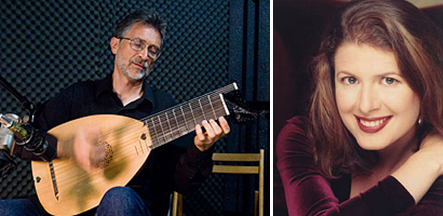by Daniel Hathaway and Mike Telin

Soprano Meredith Hall will begin this week’s Apollo’s Fire Fireside Concerts, “Drive the Cold Winter Away,” with those sentiments by sixteenth-century poet, composer and lutenist Thomas Campion from his song of the same name. “Given the way the winter has been — power outages and such — this theme is a fairly easy one to latch onto,” Hall said in a phone conversation. “What we’re doing is banding together and having an evening celebrating something warm!”
“Campion’s song inspired the program,” said Grammy-nominated lutenist and guest music director Ronn McFarlane, also in a phone conversation. “It’s an Elizabethan and post-Elizabethan show focusing on the English ballad repertoire featuring works by Dowland, Purcell and my favorite composer, Anonymous. Billy [William] Sims will join us on lute and theorbo and Kathie Stewart will play flute and recorder.”
Ballads were the popular music of the Elizabethan period, often circulated as “broadsides” or printed sheets of lyrics that could be fitted to tunes — or families of tunes — that everybody knew and which may have originated as improvisations over bass patterns like the Romanesca. “There will be several versions or different takes on ‘Greensleeves'”, McFarlane said, “some of them so radically different that you won’t even recognize what they are.”
In keeping with tradition, McFarlane, Hall, Sims and Stewart will be making their own “arrangements” of the ballads, sometimes on the spot. “We have to become Elizabethan musicians,” McFarlane said, “playing by ear and improvising counter-melodies. We’ll roll up our sleeves and become co-composers like a bluegrass or jazz group where the instruments have roles but not written-out parts.”
The group will meet up in person for the first time at the beginning of the week, although thanks to the Internet, the musicians have been closely in touch to plan the repertoire and establish some points of departure for their interpretations. McFarlane and Hall will come together for the very first time at that initial rehearsal, but they have already had an uncanny meeting of minds. “Ronn magically suggested three songs that I was hoping to do anyway,” Hall said, “and all three of the Dowland he suggested I had wanted to do. He was a bit of a mind reader.”
Hall went on to describe what appeals to her about John Dowland’s songs. “He has an ability to set the text in a way that it always remains a musical line. He’s not filling it with theater, but within that musical line there is always a way to sing the text as though it were a speech. But if you were to sing the tune without the words they would still be very good songs.”
In fact, some of the songs and ballads on the program will be purely instrumental, and there will be one novelty McFarlane will play with Sims that will be fun for the audience to watch: Dowland’s My Lord Chamberlain’s Galliard, ‘An invention for two to play upon one lute.’ That’s a physical feat,” McFarlane said, “a very clever piece written so that the four hands don’t get tangled up except at the end when they have to cross, which provides some visual humor!”
Part of the charm of the Fireside Concerts is their intimacy, a particularly important consideration where the quiet voices of lutes are involved. “A seventeenth-century French writer said that only two or three people should listen to the lute at a time,”, McFarlane noted, “and preferably at night when the sounds of the city had died down. That’s not a viable business model for Apollo’s Fire, but there are ways of drawing an audience in, even in a larger room.” The ensemble will have to apply those techniques in three of the venues, which are church sanctuaries. The fourth, Rockefeller’s Restaurant in Cleveland Heights, is smaller and actually boasts a fireplace.
Hall said, “I see the program as an intimate evening that falls in between the court and the servants’ hall — floating somewhere between Upstairs and Downstairs. I want to have the feeling that we are entertaining ourselves in company, the courtiers and the cellarers themselves performing for each other. I see my role as being the voice of the poems. I’m trying to create a character that floats between those two worlds, one who entertains the court at their level and the common folk at theirs as well. While it can be dramatic it should never lose the intimacy of being a group participation rather them a performance. Ultimately it would be great if we could all be sitting around the hearth, drink in hand and a couple of dogs on the floor.“
Published on ClevelandClassical.com January 20, 2014
Click here for a printable version of this article.



